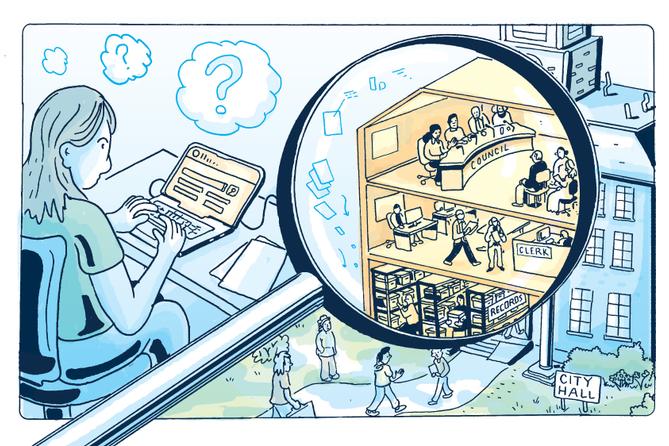This story first appeared in Talk of the Town, a weekly newsletter by Spotlight PA’s State College regional bureau featuring the most important news and happenings in north-central Pennsylvania. Sign up for free at spotlightpa.org/newsletters/talkofthetown.
How Local Government Works is a series that focuses on issues and trends in Pennsylvania local governments and provides tools for readers to hold their local officials accountable.
STATE COLLEGE — What do your nearest park’s playground equipment, your neighborhood’s trash pickup frequency, and your closest library’s services all have in common?
They are probably overseen by your local government, which deeply influences our daily lives in big and small ways.
To keep core services running smoothly, municipalities create policy, levy taxes, borrow money, authorize spending, administer public services, and more.
This can make it tough for the average person to judge how well their local government is performing, because no uniform rule outlines what needs municipalities must meet.
Local governments in Pennsylvania have delegated powers, meaning they “can only do things specifically declared by law to be within their authority, or things the courts interpret as necessary to carry out such powers,” according to a guide published by the Pennsylvania Governor’s Center for Local Government Services. Home rule municipalities, such as Philadelphia and Ferguson Township in Centre County, are exceptions because they can do what is not prohibited by superseding laws.
The services provided by any borough, township, or city can vary widely: police and fire protection, road infrastructure, sewage collection, parking and traffic control, zoning, park maintenance.
State law doesn’t explicitly require that local governments provide specific services — although the statute governing financially distressed municipalities does outline eight basic offerings it calls “vital and necessary.” It instead gives municipalities the authority to provide such services. In practice, though, constituents expect many fundamental functions from local governments, and local officials broadly recognize those needs and work to meet them.
“Every community … gets to set their own standard for what’s important to them and what they can afford,” said David Sanko, executive director for the Pennsylvania State Association of Township Supervisors.
That’s why people tend to trust their local government more than the state or federal ones, he added.
“It’s more responsive, and it’s more customizable, if you will, to the needs of the community,” he said. “It doesn’t try to be everything to everyone.”
Governing bodies — such as a borough council or a township board of supervisors — carry out municipal actions in the form of ordinances or resolutions. This information is typically accessible through open records, from which residents can find out what their local government has promised to do.
Public works and utilities such as airports and water systems can be expensive, and local governments can choose to form municipal authorities to finance and manage those projects. More than 1,500 authorities in Pennsylvania provided a variety of services in 2022, according to the latest numbers available from the state Department of Community and Economic Development.
Rising costs of materials and personnel, along with the growing complexity of state and federal regulations, have made providing public services locally more difficult, Sanko told Spotlight PA. Larger municipalities tend to face more competing needs from the community that tug at limited resources, he added.
At the end of the day, people judge the effectiveness of services provided by local governments based on their quality of life, he said. He encourages residents to attend public meetings and volunteer so that local actions reflect their community’s needs.
SUPPORT THIS JOURNALISM and help us reinvigorate local news in north-central Pennsylvania at spotlightpa.org/donate/statecollege. Spotlight PA is funded by foundations and readers like you who are committed to accountability and public-service journalism that gets results.

